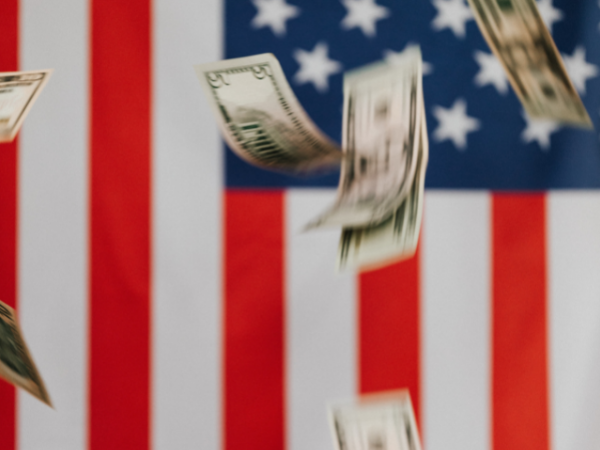Hyperinflation – what causes it, and how do I prepare?
You may have heard of inflation, but what about hyperinflation? Due to the coronavirus pandemic, you’ll hear more news about how the prices of goods and services rise nonstop. Yet, some people sound the alarm for extreme increases soon. This is what experts call hyperinflation, and it’s happened numerous times in different countries!
Others believe these fears are just exaggerated and inflation will not reach such levels. Still, the best idea would be to prepare nonetheless, especially due to the uncertainty brought by COVID-19. Nobody thought this virus would be such a big deal, yet many countries are still under lockdown because of it. The same could be true for super-high inflation.
Fortunately, you can prepare for such a scenario right now. Before we get into the steps, though, we should talk more about hyperinflation, the factors that could make it happen, and its effects on your life. We will also see how likely this could happen in the US. Finally, we will talk about how you can prepare in case it happens.
What is hyperinflation, and how does it affect me?

The prefix “hyper” refers to “excess.” If you connect it to inflation, this means an extreme increase in the prices of consumer goods and everything else.
This often happens due to governments increasing the money supply in their countries. In turn, there’s too much money chasing too few goods.
You may check the law of supply and demand to see what happens. When the former goes up, and the latter goes down or stays constant, value or prices tend to rise.
This means you’ll have to spend more money to buy the same amount and quality of goods and services. In other words, your purchasing power goes down because of hyperinflation.
Believe it or not, this has happened in the past. In November 1923, Germany’s Weimar Republic lost in World War I, so it had to pay reparations for all the damage it caused.
Unfortunately, it couldn’t keep up with the payments. That’s when the government printed more money, which resulted in one of the most well-known cases of hyperinflation in history.
It lived up to the “hyper” in its name. By January 1923, a loaf of bread cost 250 marks, and then it skyrocketed to 200,000 million marks in November 1923!
If you’re from the United States, you might remember the gas shortage that resulted in high petrol prices. Now, imagine filling your tank if the gas prices went up that much!
Is the US headed for hyperinflation?
Printing money for war reparations is just one example of how prices can reach such ridiculous levels. Yet, we might be seeing another one about to happen in the US due to COVID.
The United States experienced a drastic increase in money supply during the pandemic, and this occurred because the government borrowed more money for its COVID response.
In October 2020, pandemic spending reached higher than $21 trillion, bigger than its economy. At the time of writing, it’s at $28 trillion, and it is still going up!
You may check the US Debt Clock yourself for real-time updates. What’s more, the rate of inflation from August 2021 was 5.3%, and the annual inflation rate for 2020 was 1.23%.
You may also check the consumer price index to gauge inflation. In September 2021, it was at +0.4%. Despite these high numbers, the US Central Bank chair assured the public that 1970s-style inflation is unlikely.
Another factor outside the US may contribute to this hyperinflation: Evergrande. This real estate giant is considered China’s largest junk bond issuer.
It owes $90 billion in debt and $300 billion in liabilities, but it’s having trouble paying back investors. In turn, they’ll have a hard time paying staff who won’t have money as well.
This may reduce Chinese imports and slow demand for raw materials. As a result, companies relying on Chinese trade may suffer. Also, a Morgan Stanley analyst warns about the stock market.
Mike Wilson said that the stock market could drop by 20%. We already see similar effects in other countries, and South Korean stocks felt a pinch recently because of Evergrande.
Experts say we won’t know for sure if hyperinflation is likely until it happens. Yet, people see these factors might mean it will occur. Until then, it’s a good idea to prepare.
Read More: How To Calculate The Inflation Rate
How do I prepare for it?
A debt-free lifestyle is your best bet against this scenario. In other words, your priority should be reducing how much you owe, getting rid of it if you can.
Then, you’ll have to set aside some money and keep your expenses low. This is the gist of what you need to do. Let’s go over all the steps in more detail:
- Pay debts – Get rid of the ones you can easily pay, such as those with adjustable interest rates or low balances. You could use debt reduction methods like consolidation or settlement to help you. Once you don’t have monthly payments anymore, you’ll have an easier time spending on basic needs.
- Reduce expenses – Spend as little money as possible on everything. If you can find cheaper alternatives for your groceries, buy those instead. Avoid buying things you don’t need, but purchase backups for major home appliances. If you can buy ones that run on solar power instead, those might be better.
- Stockpile what you need – Keep a supply of food you usually eat that can last up to three months. If you can, grow food at home. Have at least two weeks’ worth of drinking water for every family member. Keep an amount of money handy in case you can’t buy online anymore.
- Find ways to make money – Make sure everyone in your family should have a way of earning money. Fortunately, you can find so many work-from-home jobs right now, and these let you make money from the comfort of your homes.
- Stay positive – You might be worried sick after reading these tips. Yet, you should keep a positive attitude despite these. Check our tips on keeping your mental health here.
- Invest in growth assets – You’ll need a positive outlook in life, or you will never see any good investments. Look for those that are likely to outperform the market, such as growth stocks or cryptocurrencies. Safer bets like bonds and gold are likely to lag.
How can businesses prepare?
If you have a business, you may have ideas on how this could affect you. People will have a harder time buying stuff, so you may lose customers and struggle to get new ones.
Also, you may not be able to get the supplies you need on time. And they will probably cost even more. In turn, you might have to increase prices or decrease expenses.
You can start preparing for hyperinflation by looking for your “exit point.” It’s that level where you can no longer make money. See if you can continue and break even.
If not, perhaps you can take a few losses with your other companies or cash reserves. If you fit these conditions, you might want to keep your doors open, so you don’t permanently shut down.
Foreign currencies are bound to take a hit during hyperinflation. That’s why you might want to check your overseas branches. See how you should adjust those to fit the current conditions.
Related Articles
Final thoughts
Hyperinflation happens when a country undergoes an increase in the money supply. This causes prices to rise to such a degree that most people can’t afford anything.
We don’t know for sure if this will happen or not. Still, it’s always a good idea to improve your finances. As you’ve seen, it’s not as hard as you may think.
If you can, though, you might want to invest as well. Many assets have low prices right now, so it’s a great time to buy some. Learn more about them from the other Inquirer USA articles.
Sponsored Advertising Content:
Advertorial or Sponsorship User published Content does not represent the views of the Company or any individual associated with the Company, and we do not control this Content. In no event shall you represent or suggest, directly or indirectly, the Company's endorsement of user published Content.
The company does not vouch for the accuracy or credibility of any user published Content on our Website and does not take any responsibility or assume any liability for any actions you may take as a result of reading user published Content on our Website.
Through your use of the Website and Services, you may be exposed to Content that you may find offensive, objectionable, harmful, inaccurate, or deceptive.
By using our Website, you assume all associated risks.This Website contains hyperlinks to other websites controlled by third parties. These links are provided solely as a convenience to you and do not imply endorsement by the Company of, or any affiliation with, or endorsement by, the owner of the linked website.
Company is not responsible for the contents or use of any linked website, or any consequence of making the link.
This content is provided by New Start Advantage LLC through a licensed media partnership with Inquirer.net. Inquirer.net does not endorse or verify partner content. All information is for educational purposes only and does not constitute financial advice. Offers and terms may change without notice.




